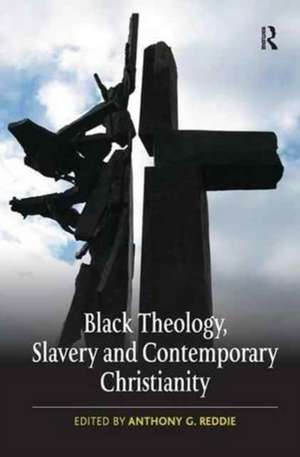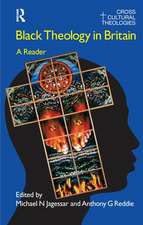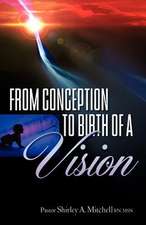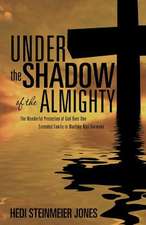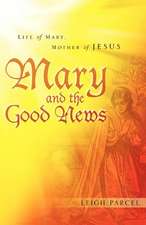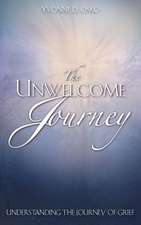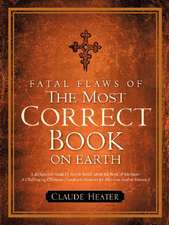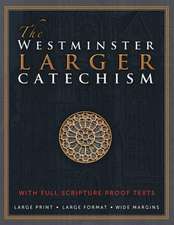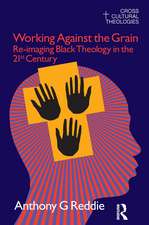Black Theology, Slavery and Contemporary Christianity: 200 Years and No Apology
Editat de Anthony G. Reddieen Limba Engleză Paperback – 16 noi 2016
| Toate formatele și edițiile | Preț | Express |
|---|---|---|
| Paperback (1) | 485.40 lei 6-8 săpt. | |
| Taylor & Francis – 16 noi 2016 | 485.40 lei 6-8 săpt. | |
| Hardback (1) | 1060.19 lei 6-8 săpt. | |
| Taylor & Francis – 28 aug 2010 | 1060.19 lei 6-8 săpt. |
Preț: 485.40 lei
Nou
Puncte Express: 728
Preț estimativ în valută:
92.89€ • 96.39$ • 77.64£
92.89€ • 96.39$ • 77.64£
Carte tipărită la comandă
Livrare economică 15-29 martie
Preluare comenzi: 021 569.72.76
Specificații
ISBN-13: 9781138279148
ISBN-10: 1138279145
Pagini: 242
Dimensiuni: 156 x 234 x 21 mm
Greutate: 0.36 kg
Ediția:1
Editura: Taylor & Francis
Colecția Routledge
Locul publicării:Oxford, United Kingdom
ISBN-10: 1138279145
Pagini: 242
Dimensiuni: 156 x 234 x 21 mm
Greutate: 0.36 kg
Ediția:1
Editura: Taylor & Francis
Colecția Routledge
Locul publicării:Oxford, United Kingdom
Notă biografică
Anthony G. Reddie is a Research Fellow at the Queen’s Foundation for Ecumenical Theological Education in Birmingham. He has a BA in History and a PhD in Education (with Theology), both degrees conferred by the University of Birmingham. He has written over 50 essays and articles on Black theology and Christian education in Britain. He is the author and editor of 12 books. His more recent titles include Dramatizing Theologies (2006), Black Theology in Transatlantic Dialogue (2006), Black Theology in Britain: A Reader (co-edited with Michael N. Jagessar, 2007), Working Against The Grain (2008) and Is God Colour Blind? (2009). He is the co-editor of the 'Cross Cultural Theologies' book series for Equinox and editor of Black Theology: An International Journal.
Recenzii
'The centrality of slavery in the creation of the modern western world is beyond doubt. The history of the enforced movement of millions of Africans across the Atlantic continues to generate fierce political and historical debate. Here, Anthony G. Reddie has assembled a string of compelling contributions to the broader theological debate spawned by slavery. Not always easy or comfortable, the essays force the reader to confront vital moral and theological problems, not merely of the historical past, but of the contemporary world. They tease out the anomalies (of Christianity's role both in supporting, and then in ending slavery) and the challenges faced by Christians when studying the painful story of enslavement in the Atlantic world.' Jim Walvin OBE, University of York, UK 'This is the first intellectually formidable book on the Atlantic slave phenomenon from the perspective of Black Theology. The interdisciplinary scholarship and the cast of scholars and practitioner contributors to this text are unprecedented. Black Theology, Slavery and Contemporary Christianity challenges, enlightens, and delights us. I look forward to teaching and sharing this work with my students and colleagues.' Dwight N. Hopkins, University of Chicago, USA, author of Being Human: Race, Culture, and Religion 'An important interpretation of black liberation theology.' James H. Cone, Union Theological Seminary, USA ’The book is a tour de force, which highlights the practical nature of Black theology not only as an academic discipline, but a subject with real practical out-comes. All the writers seem committed to raise the collective consciousness about the legacies of slavery and how these have played out in Christianity. I have to congratulate the editor, Anthony Reddie, for teasing all the disparate elements and threads into a coherent whole.’ Black Theology
Cuprins
List of Contributors, Acknowledgements, Introduction, Part I Slavery and Biblical Hermeneutics, Part II Slavery, Colonialism and Black Subjugation, Part III Slavery and Contemporary Experience through the Lens of Black Theological Reflection, Index
Descriere
Black Theology, Slavery and Contemporary Christianity explores the legacy of slavery in Black theological terms. Challenging the dominant approaches to the history and legacy of slavery in the British Empire, the contributors show that although the 1807 act abolished the slave trade, it did not end racism, notions of White supremacy, or the demonization of Blackness, Black people and Africa. This interdisciplinary study draws on biblical studies, history, missiology and Black theological reflection, exploring the strengths and limitations of faith as the framework for abolitionist rhetoric and action.
